This year was The University of Lincoln’s third year taking part in The Big Draw Festival. The University held three days’ worth of events in which 90 pupils from both Primary and Secondary schools came together under the theme of #Play2018 to have fun and explore all the joys that drawing and being creative has to offer!
We are thrilled to have been able to catch up with Brian Voce, a Senior Lecturer at the University of Lincoln’s College of Arts, and find out all about this year’s events at the University – we also got to hear his opinion on the importance of drawing in everyday life, and the role of Play and creativity in education, development and wellbeing.
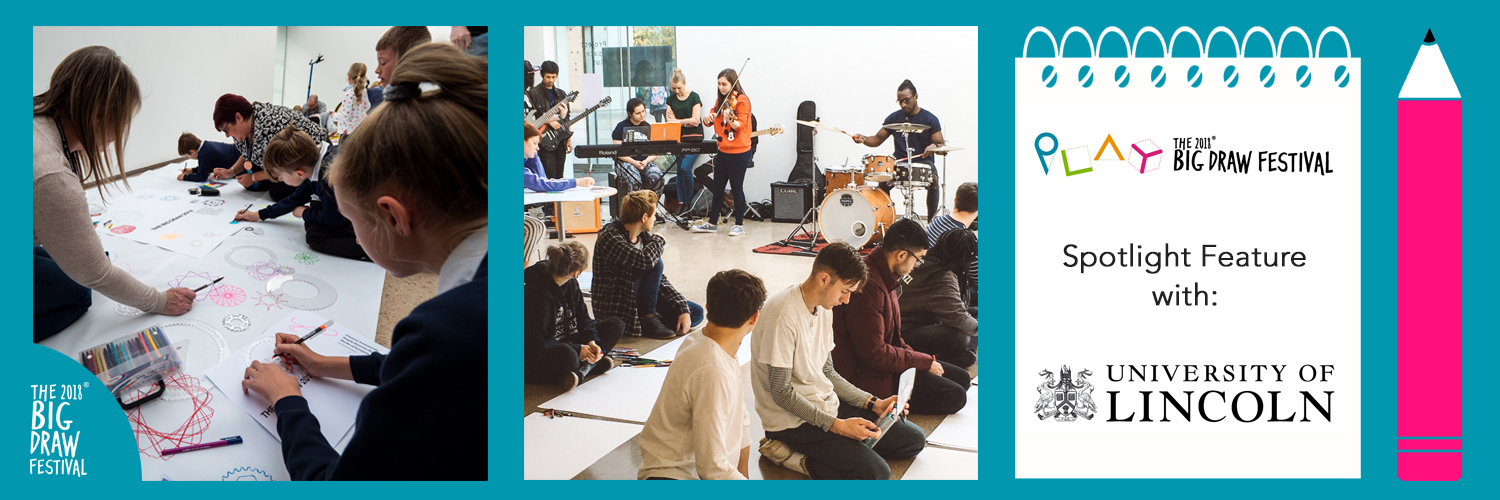
Hi Brian! Thanks so much for talking to us today. Could you start us off by telling us a little bit about your work as a Senior Lecturer at the University of Lincoln’s College of Arts?
I’m the Year Leader for Year Two Graphic Design. I teach Visual Expression to Years One and Two on the BA Hons Graphic Design course, and until this year also taught on Year One Creative Advertising. I’m not a Graphic Designer, (my practice is now print, digital and painting based), however one of the key strengths of our course is that our students are taught by Graphic Designers, Printmakers, Fine Artists, Photographers, Branding Experts, and Theorists, all of us continue with our creative practice and the consequence of this is that the students have a hugely diverse and enriching educational experience.
My area is really all about creative thinking, experimentation, and getting the students to be comfortable with being uncomfortable (taking a few risks in their design practice). I focus on pushing the student's creative approaches to design solutions, this might be through experimental drawing, film, sound, print, or even creative cake making!
I’m also the contact person in the School of Design for schools and colleges wanting to visit or participate in workshops here.
Before I worked at the university, I was involved in Further Education, Community Arts, Schools Workshops, and Offender Learning. In all these situations drawing played a key role my approach to teaching art and design, forming the foundation from which students could progress.
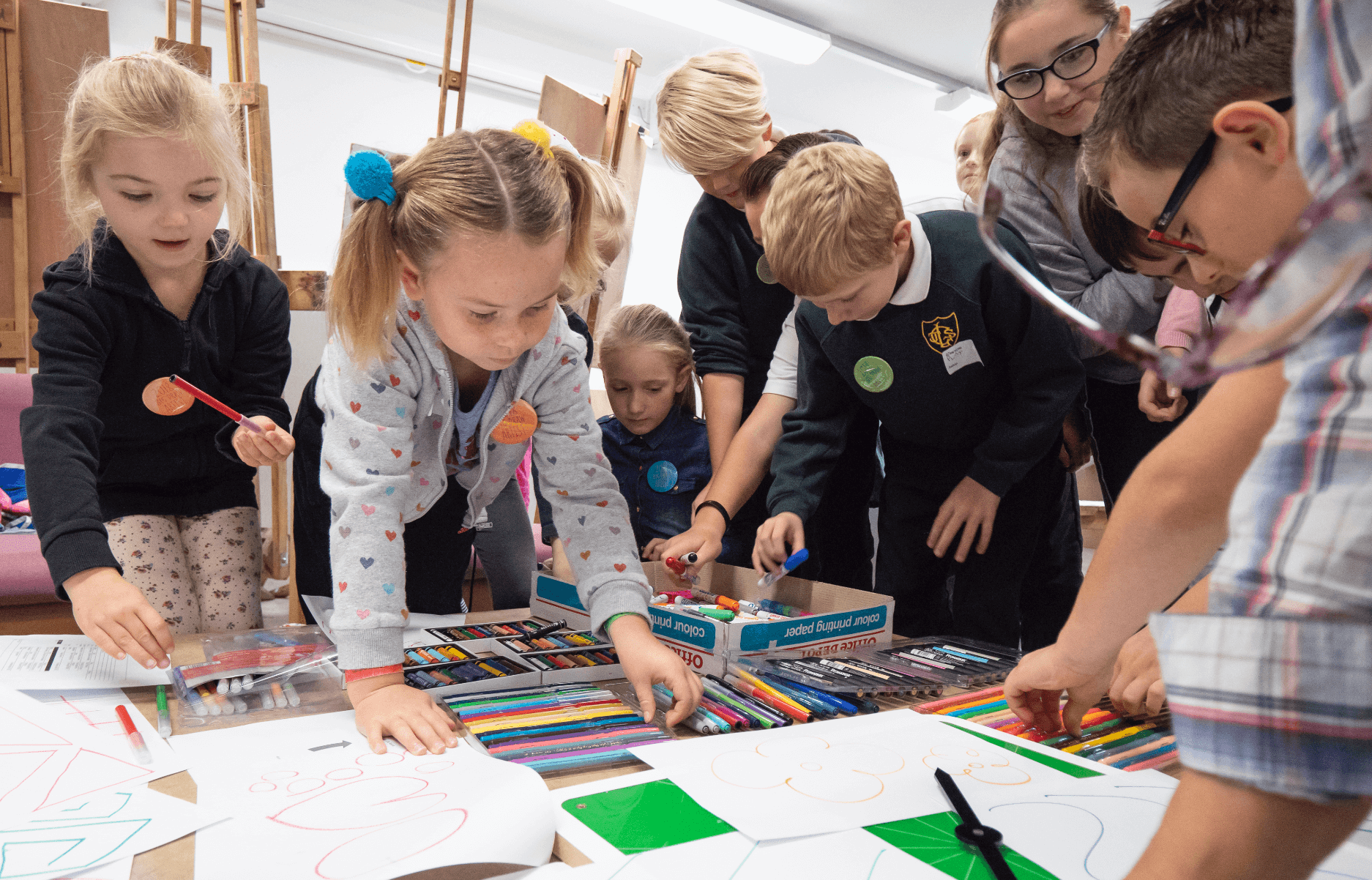
In the UK, the EBacc has had a devastating impact on the endorsement of creative subjects (which include Art, Music, Media, Design & Technology); in the past year alone we have seen a 10.2% decline in the uptake of these subjects. Yet recent research and opinion pieces published by Forbes and The Washington Post suggest that creativity will be the most vital skill of the future. What role do you think that Universities should be playing in the access to arts and creative learning? Why do you think the next generation of makers and creators are so important?
Talking to applicants and parents at Open Days I often hear that pupils can only make one creative choice at GCSE or A level where they would often have liked to choose more, the creative arts (across the board) are certainly getting squeezed by the EBacc. (Not the case for my son who only a few years ago chose two creative A levels and who’s GCSE choices included Art, Drama, Music, and Design Tech).
Universities have championed the importance of the Arts and a Creative Curriculum (for example in the 2015 Warwick Commission Report which highlighted the value of the creative and design industries to the UK Economy). I think universities must continue to pursue academic research of this kind to keep up the pressure on Governments to give more prominence to the creative arts. As institutions Universities can support the creative arts by creating spaces and opportunities for young people over a whole range of activities through workshops and summer schools, (this is something we already do through our Saturday Art Club, Summer School events and of course The Big Draw). Supporting Schools directly is also important; at Lincoln we run school visits and presentations, host taster days, workshops, and faculty tours. Additionally, we work with Design teachers across our County to host the Lincolnshire Young Designer of the Year Competition.
It’s vital that we all work hard to encourage and develop young people’s creativity for a number of reasons. One of our nation’s greatest strengths is our innovative creative talent (our designers and design schools lead the world here), it would be catastrophic for our economy if we were to lose our pre-eminence in this area by letting the creative talents of a whole generation ‘slip by’. I often think that our approach to design education parallels what happened to our car industry in the 70’s. We were good at making cars, became complacent and other nations overtook us, it’s the same situation with the creative industries today, as a nation we’re not just good we’re great at creative design, but I think the importance of design and training new designers is overlooked and undervalued, (somehow it will take care of itself). Other nations are catching up, if we are to retain our position as a World leader in design and design education then we really need to encourage this and give it more prominence in the school curriculum.
We’re also going to potentially end up with a lot of creatively frustrated and unfulfilled individuals, in terms of health and personal fulfilment the creative arts are so important.
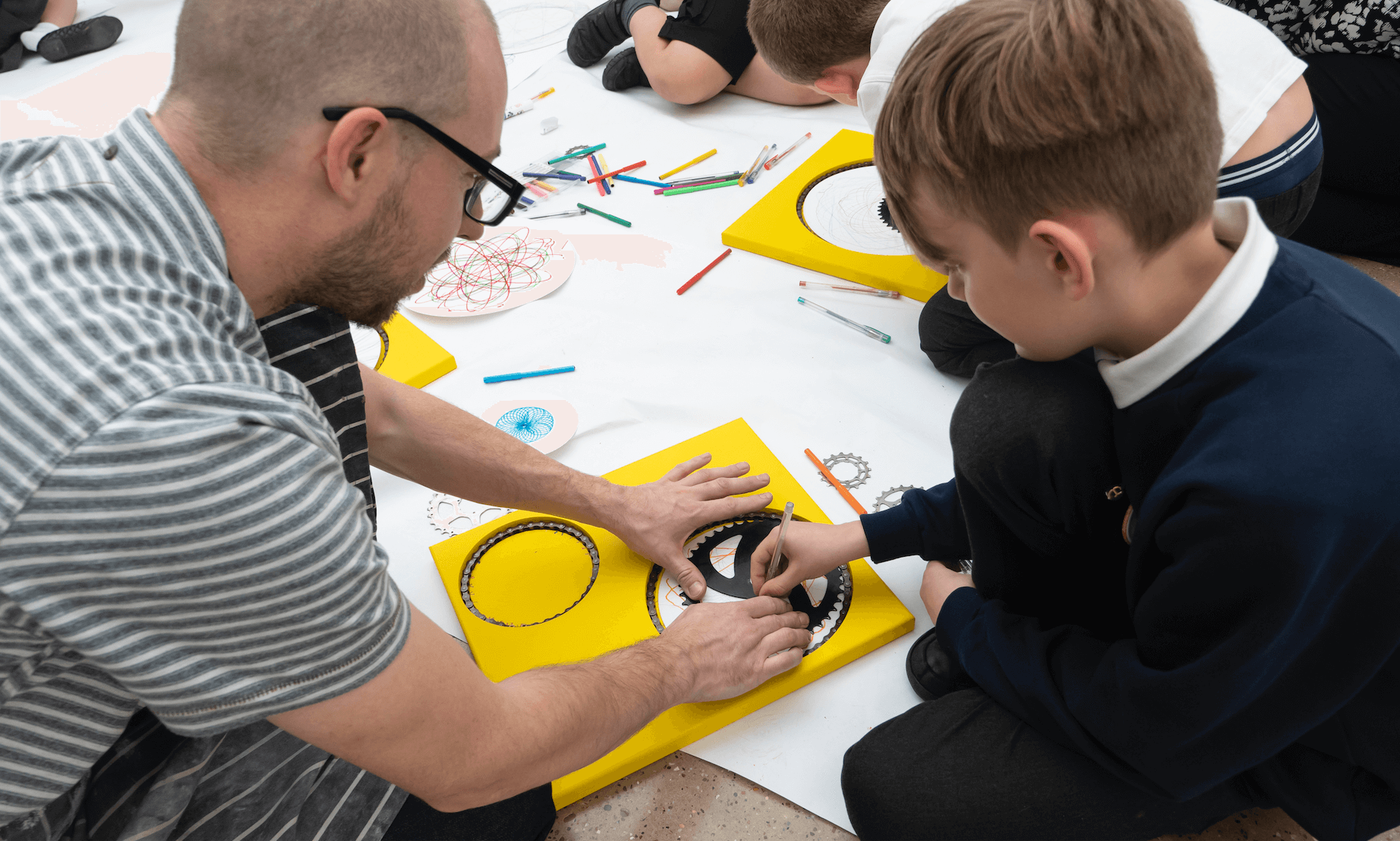
We believe that drawing is a medium for thought and action. It is a fantastic tool for communication, creativity and expression! What role does drawing play in your day-to-day life, and your work at the University of Lincoln?
Visual development (and to us that means exploring research and ideas through drawing, drawing, and more drawing) is at the core of our course. It’s so important to us, we encourage and expect our students to work out all their ideas through drawing before they move to digital production. We believe drawing is THE way to explore and refine ideas. We’re not looking for academically accurate drawing from our students (although it’s great to see students with those skills) rather we’re looking to build up the confidence of our students to visualise ideas, and to this end we’re non-judgmental about the technical ability of our students to draw. It’s more important to us that they have the confidence to explore ideas through drawing and show us what they’re thinking, (refinement can come later). Some of our students are interested in illustration and we encourage all students to explore this in their work, here drawing is always the start of that process.
Personally, I use drawing as a research tool, as a way of looking (seeing to gain understanding), and to explore ideas. I also use digital drawing (sometimes combined with traditional drawing) to develop my own work. I don’t draw every day (although my wife does) as I’m often too busy with university work but nevertheless it’s an essential part of my practice.
I think everyone can draw but not everyone has the confidence to draw or can interpret a drawing. For me it’s not about being a ‘good drawer’, not everyone can draw academically well, (I speak from my experience of teaching Adult Education drawing classes for over ten years), but about being confident in your drawing and enjoying drawing. As a method of communication drawing is indispensable in terms of getting ideas across to others. I’ve lost count of the times a student has described in detail what they are going to do, and then found that their final work looks nothing like the ‘picture’ I had in my head! A drawing, however crude communicates clearly and ‘nails’ this every time. In this context I think drawing would be a powerful tool to communicate concepts in lots of areas if everyone drew more and were more confident in their drawing skills.
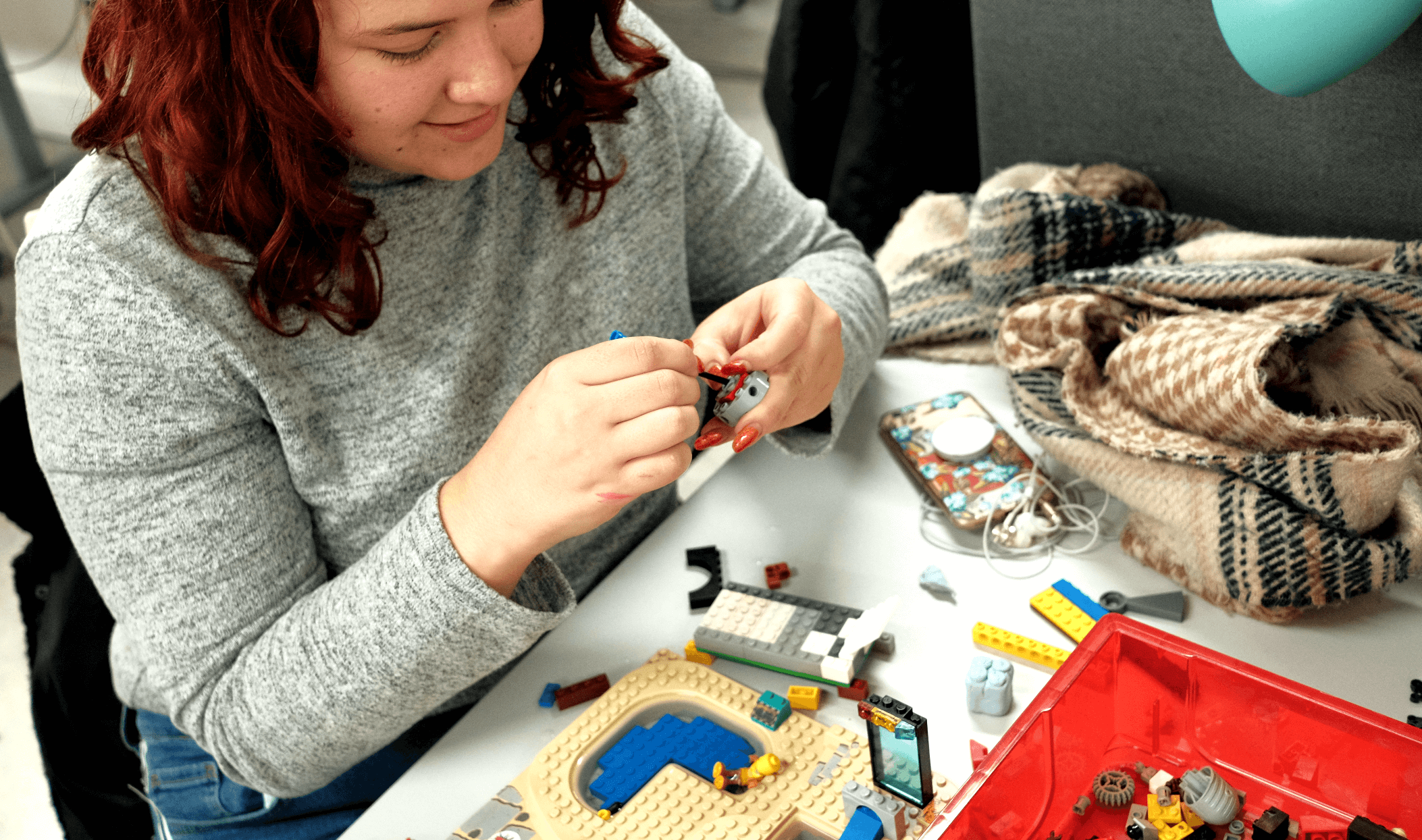
This year, The Big Draw Festival has been celebrating the power of Play in the creative process, and its role in innovation, well-being and development - research has shown that play is not only a vital tool in child development but also essential for well-being and discovery through to adulthood. Do you believe that a playful approach is important in an educational setting?
Absolutely. Play (and feeling free to play) is an essential element of creativity. We refer to risk taking, (not playing safe) with our students. Playing with ideas, (trying stuff out, testing out ideas, materials and techniques) is essential to risk taking and originality. Our First-Year students are often very conservative in their approach to ideas, and expect staff to tell them what to do, and what to make. In Higher Education the creative arts have an emphasis on exploring ideas and finding a personal solution. This often comes as quite a shock, especially to students where their previous creative education has been quite formulaic. Building their confidence to play with ideas through drawing is an essential part of our curriculum.
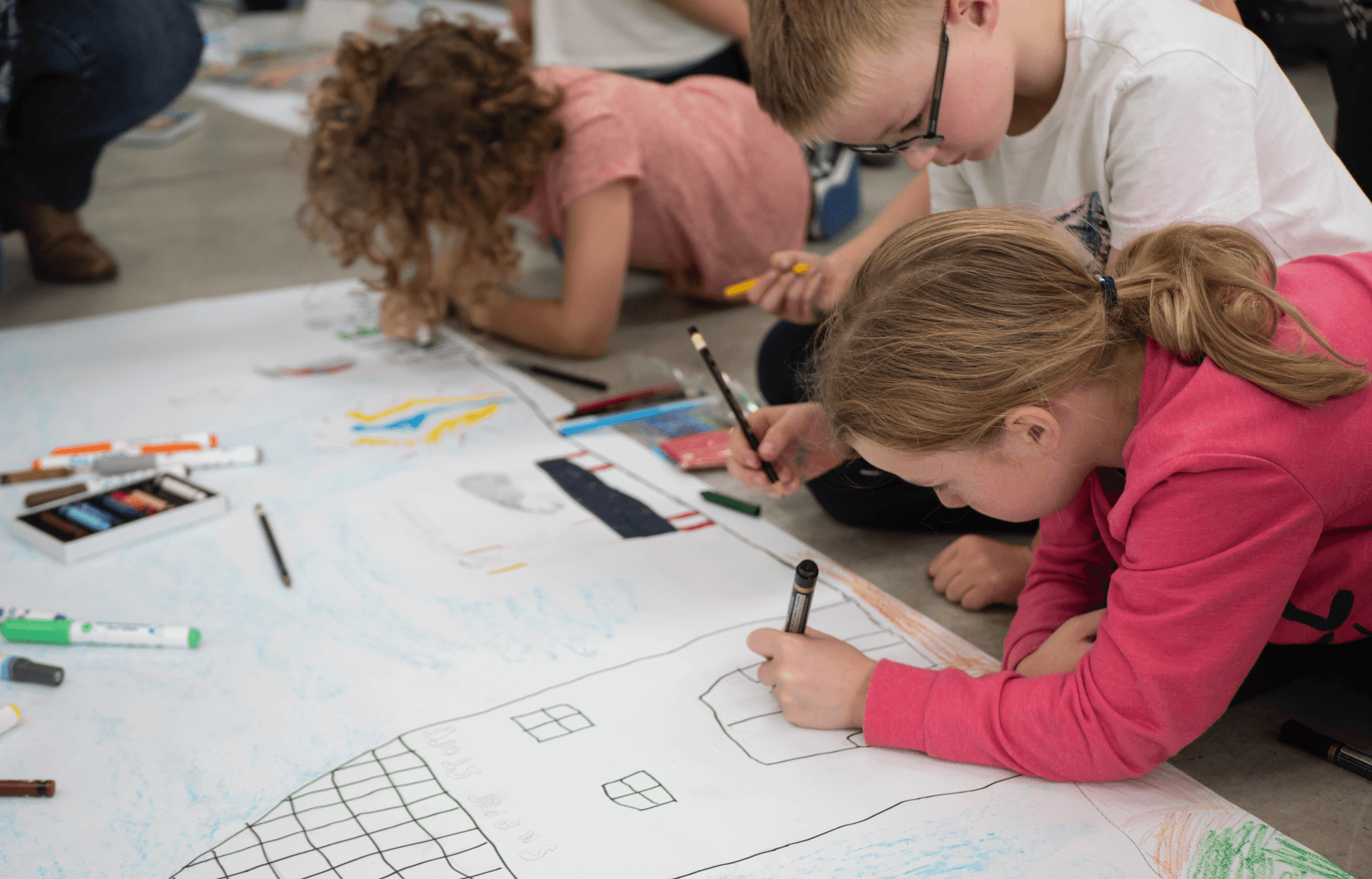
This was the University of Lincoln’s third year organising an event for The Big Draw Festival. What inspires the University to take part in the Festival? Moreover, what are some of the biggest challenges you have faced/overcome in organising these events?
The Big Draw is a natural ‘fit’ for us within the College of Arts as drawing is fundamental to everything we do. We believe that everyone can draw and enjoy drawing, and through activities like the Big Draw we hope to encourage and inspire young people to become the artists and designers of the future.
Our Big Draw Celebration is part of the University’s philosophy of promoting schools and public engagement. Encouraging young people from all over our county to aspire to Higher Education is part of our community mission and naturally we would like the University of Lincoln to be their first choice. As England’s second largest county (and also being sparsely populated and largely rural) we have areas where there is historically a very low application for and progression to Higher Education. The Big Draw is a great way to attract children from across the county to participate in a University hosted event, ‘introduce’ young people to the University and to sow the seeds of ‘aspiration’.
My biggest challenge in organising the Big Draw has always been getting our message and event details over to the right person within schools. Primary schools always respond well (we could fill our event with pupils from a single school)! However Secondary Schools often don’t respond at all! Building personal relationships with art and design teachers within schools, (visiting schools, giving presentations, inviting them to visit the university, etc) is key here otherwise our emails often seem to ‘get lost’ in their systems.
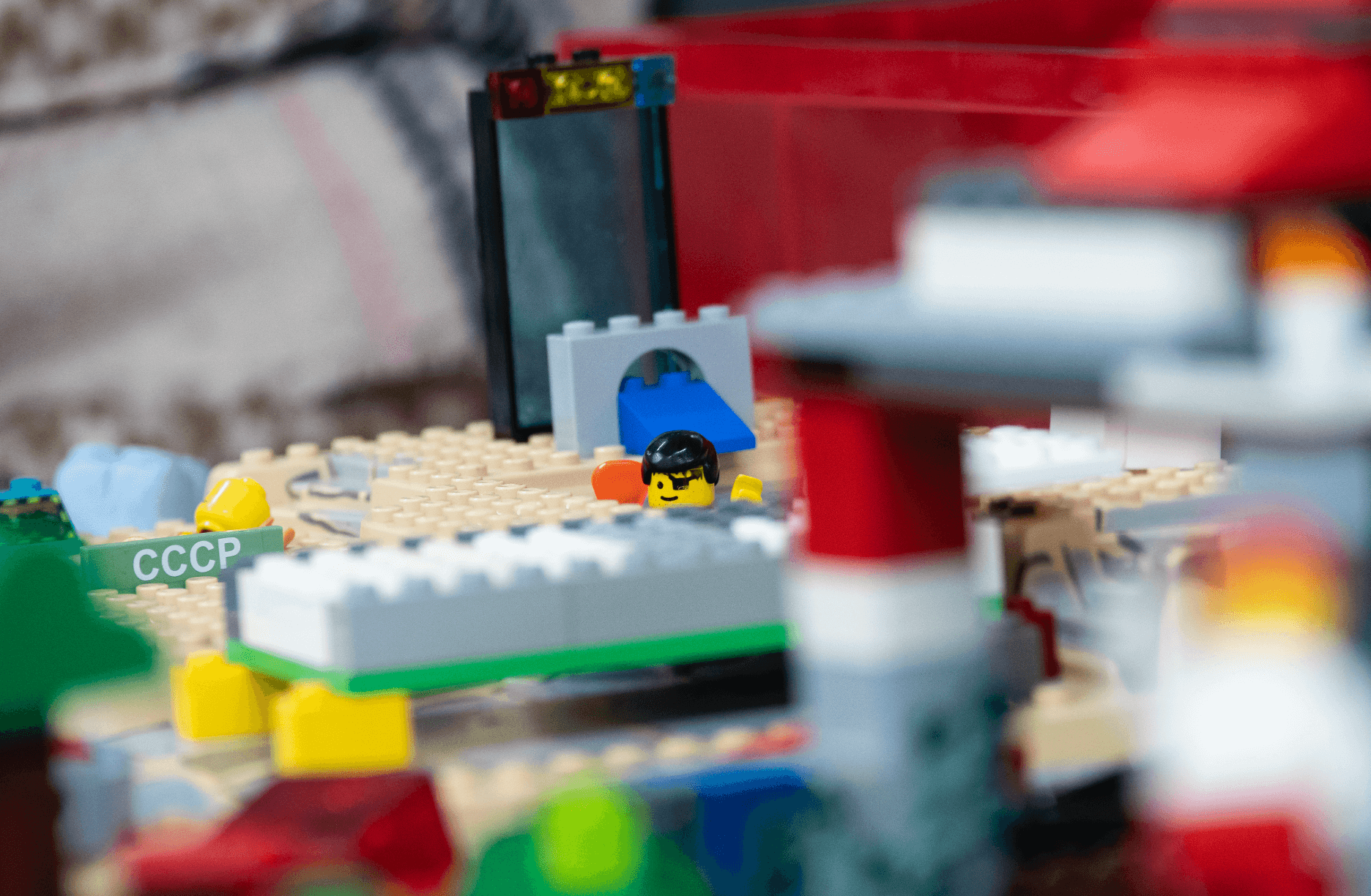
Finally, could you tell us a little about this year’s event? Were there any stand-out moments for you?
This year’s Big Draw took place on the 15th/16th/17thof October. 90 pupils from three Secondary Academies, and six Primary Schools came together under the theme of ‘Play’ to explore the joy of drawing and express themselves creatively.
Our visitors participated in a range of workshops featuring Computer Animation, Creative 3D Drawing with Lego, Animation Drawing directly onto film, Kinetic Bicycle Drawing (using bicycles kindly donated by Lincolnshire Police), Drawing and Storytelling, ‘Draw to Score’ (Interpreting music into drawing and re-creating it as graphic scores), and ‘Body Snap’ (imagine ‘Twister’ as a drawing game).
It's hard to identify a single standout moment as everyone involved worked hard to create a range of fabulous activities. However, I’d really like to mention the ‘spirograph’ bicycle drawings created from ‘bike bits’ (chains, wheels and cogs) built and run by our amazingly skilful and helpful technical staff, and also the fabulous animated films made by drawing directly onto 16mm filmstock. Also ‘Draw to Score’ where we were joined by our Music students who formed two live bands. Band 1 played music which our visitors interpreted into abstract drawings, then Band 2 reinterpreted the drawings into improvised music performances. Each student had their score (drawing) played back to them.
The emphasis was firmly on creating a fun day and a positive experience of the University for young people.
Thank you to Brian, and the team at the University of Lincoln!

Interview by: Matilda Barratt
The University of Lincoln is one of our Big Draw Festival 2018 Sponsor Partners.
Are you a teacher interested in drawing as a powerful learning tool in the classroom? Join us in partnership with The University of Lincoln and The Hepworth Wakefield for a free Big Draw CPD session on 29 November - details here.
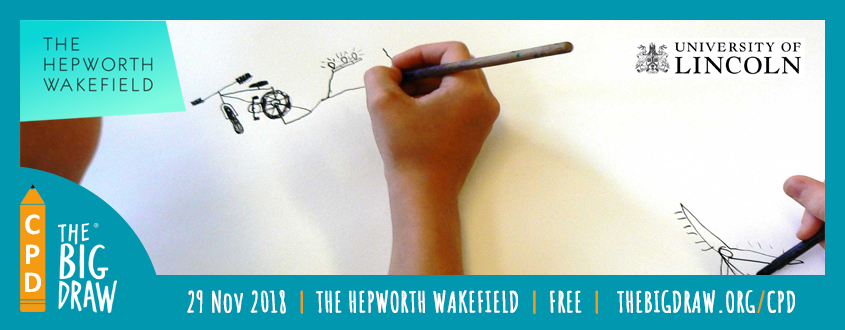
The Big Draw's worldwide impact is made possible by the support of many organisations and individuals who share its vision. Without them and the commitment of hundreds of venues across the globe, our mission would be unachievable. Interested in becoming a festival Sponsor-Partner? Take a look here.
We hope you enjoyed our interview with Brian Voce, Senior Lecturer at the University of Lincoln! If you have been inspired by his insights why not become a part of the world's largest drawing festival in 2018 or 2019? It's not too late! Visit our Organise an Event page for guidance on getting started.